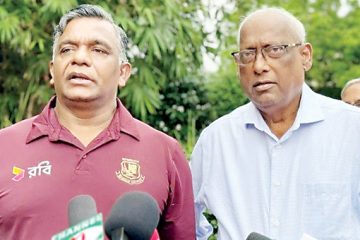The general perception on Abdur Razzak recently among the cricket fraternity has been that the left-arm spinner has lost his bite after his bowling action went through a change, but the bowler sees it quite differently.
He believes that it is the introduction of Twenty20 cricket which has made the bowler’s job difficult these days.
“Yes, there is a question whether I have lost bite in my bowling after the changed action. But I think there is hardly any problem with my bowling,” defended Razzak while talking to The Daily Star.
“What I believe is that Twenty20 cricket has changed the whole scenario for the bowlers as it is now difficult for any bowler to keep the economy rate under three or four.
“For Twenty20, the batsmen have innovated some new shots and the Powerplay is also playing a big role in this regard. Look at any international bowler you find the evidence in favour of my arguments,” he observed.
The statistics however showed that Razzak lost rhythm after changing the bowling action. Before the imposition of the ban, he took 111 wickets in 81 one-day matches at 4.39 but since coming back in July 2009, he picked up just 33 wickets in 22 matches at 5.00 runs per over. His average and strike rates have also plummeted.
Mohammad Salahuddin, who played a huge role in bringing back Razzak to international cricket, nevertheless believes that the changed action has been a factor in his decline.
“My observation is that the accuracy is an asset for any spin bowlers. I think after changing of action, Razzak struggled little bit with his length and that was the reason he looked to have lost his bite in the limited-over game,” explained Salahuddin, who is now working with him at the Tigers camp.
He also drew comparisons with Bangladesh’s other left-armer, Shakib Al Hasan, saying that one of Shakib’s main strength is his accuracy.
“Shakib [Al Hasan] has very few variations with his spin but he’s very accurate as a bowler,” said Salahuddin.
The 28-year-old has had a major role in Bangladesh’s limited-over success, memorably his contribution in Tigers’ 2007 World Cup success in the West Indies. But he seemed to have lost his rhythm since making a return to international cricket in July last year after being banned for eight months due to suspect action.
So far though, 2010 has been a terrible year for Razzak as he has gone wicketless in the first five matches this year, scalping a grand total of just 11 wickets from 14 one-day internationals at an economy rate of 5.17 and an average of 60.18.
Razzak, for his part, admitted that he has been going through a trough. “I know my success rate in this year is not good. I am going through a bad patch but I am working on a few variations like the arm-ball and ball gripping.
“Right at the moment World Cup is not in my mind, rather I am looking forward to the upcoming New Zealand tour and then the home series against Zimbabwe,” he said.
Razzak’s action was declared legal after the extension of his bowling arm changed to the extent that both his stock delivery and faster ball were within the ICC tolerance level of 15 degrees.
“I think the changed action made him a better bowler but there has been a need sometime to adopt with the new action.
“Now he could be a better bowler even for the longer-version game. He is working to get back his full rhythm, especially the accuracy. I hope he gets the result in the next assignment against New Zealand,” said Salahuddin.
The bowler himself was also confident with the upcoming assignments.
“All our assignments now are at home conditions, which is a big advantage for a bowler like me. Hope the wicket will be helpful for us as it’s always in the subcontinent. I am really looking forward,” said Razzak.




















